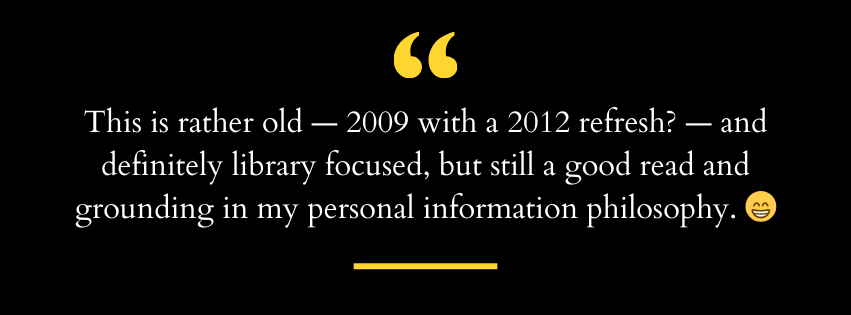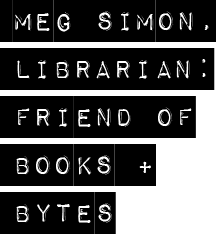
Despite over a decade of library and web-wrangling experience, I can’t say I’ve seen it all. But I have seen a lot of it — information fumbles, tech misapprehension, and taking the scenic route to achieve basic internet ends, both committed by users and inflicted upon them through atrocious (absence of or anti-) usability.
Librarians will be obsolete… when? Again? 😉
While admittedly the daily grind, bureaucracies, and hamstrung budgets have worn off some of my fresh-out-of-library-school luster, I am committed to the ideals of the profession and strive to embody its values with citizen — customers and colleagues alike.
Why should amorphous organizations get all the fun with deep thoughts and fancy words? Reflecting on my professional experiences and beliefs, I have determined my mission:
To improve user experience and enrich lives through increased education, opportunity, and engagement on the web, in the library, and in the community.
To achieve this, I:
- Intuit the unfamiliar and infer possibility
- Anticipate customer needs while checking my assumptions, and listen to what the data tells me
- Provide exemplar service with compassion

Among my top interests…
Information literacy
This is often framed as a scholarly issue. While I’m definitely interested in helping students (and instructors) understand search, research and their information needs to achieve academic success, I am especially interested in how these skills overlap into everyday life. From consumer choices to political ideologies and values construction, understanding information — how to access, evaluate, and use it, as well as recognizing the power structures involved in its creation and dissemination — shapes the foundation for an informed and engaged citizenry.
On a less grand scale… when imparting information literacy skills, I think it’s important that people get a big-picture view of how libraries make information available — and what exactly “information” is. For instance, when teaching undergrads how to find peer-reviewed journal articles, it’s reasonable to first ensure that everyone knows what peer review means. But do they know what an article is? A journal? How these relate to databases? What Google Scholar’s doing? That clicking “full text only” in subscription databases is a counterproductive, bad idea when your library has a link resolver?
OK, that last one’s a bit advanced. But for the first few basics, however much it kills me to see blank expressions, these are not stupid questions and cannot be assumed givens. They are fundamentals that will either take a minute to explain and grasp or, without them, set students up for a degree’s-worth of time doing things the hard way or with unintentional deficiency. The more people know about information, the better they will be able to navigate it, anticipate results and troubleshoot when things go wrong. And the more librarians are seen as knowledgeable — and non-condescending — the more likely people will ask us for help.
Media and technology fluency
Information is less useful — if not useless — if we can’t operate the mechanisms that unlock its potential. While information content is inherently context rich, it is also tied to its particular format. We need the skills and vision to take advantage of new formats and devices, maximizing benefits while being aware of limitations, and understanding the information behaviors and preferences of our users.
What tech-toys and internet sites do our library patrons use, and does it make sense to tailor our services to these products or models of communication? What will the DRM packaged with this ebook mean for a user’s privacy and PC security? How about when it mysteriously disappears exactly like their commercial ebooks don’t? For customers who aren’t on the internet at all, why not? Does it matter? A little part of you just died, didn’t it? But no, really, how do we make it relevant beyond needing to apply for jobs online and accessing government services?
Intuitive user design and integration of content
Although I support fostering independent library users (i.e., not spoon-feeding everything), there’s no sense making things unnecessarily hard with our largest self-serve enterprise — the library’s website and OPAC. It’s shocking and embarrassing that as champions of organization and access, even we can fail miserably at meaningfully structuring a website — especially when it’s a Frankenstein birthed in the mid-nineties, developed by dozens over the years without guiding principles for design, language, and overall structure, and without any serious attempt at unified revisions.
Even with a robust, intelligent site, I see several opportunities in libraries’ online worlds for deeper integration of content — connecting it to users where they’re already at, as opposed to building it and expecting them to come. For instance, we can hope a user discovers the database tutorials by knowing to search for them or stumbling upon them in the Skills and Workshops section, or the Information Literacy Whatever-That-Means section. Or we can link or embed tutorials, help sheets, and librarian chat directly at a database’s entrance, at the point of need (or as close as we can get, depending on the capabilities of products from outside vendors).
Communication and collaboration
I was briefly enrolled in an Information Services Consulting / Entrepreneurial Librarianship course. After the first class, I switched out — it wasn’t for me. My best ideas? — I want to give away for free. Librarians can cringe at things like Wikipedia vis-a-vis serious scholarship and respectable research, but the open source attitude of working together to formulate and refine the best product possible is remarkable if not revolutionary.
Libraries by and large all deal with the same issues and are subject to the same pressures — particularly a lack of cash. As such, collaborative projects and open communication is key to strengthening the profession. While this concept is hardly new, it deserves fresh perspective and renewed commitment, especially given the opportunities afforded by open source, flexible copyright, consortial agreements and the astounding but often taken-for-granted fact that the internet… exists. It has never been easier or cheaper to stay in touch, share information and work together on projects with colleagues — down the hall, across town, and on the other side of the world.
Lifelong learning
Cradle to grave learning and literacies must be a cornerstone of society, with opportunities for participation as a measure of quality of life — from babytime singalongs to learning about genealogy, from exploring your city’s architecture to the history of antiquity, from pursuing higher education to socializing through video gaming, from exposure and access to creative works to the tools and support to create such works yourself.![]()
I want never to stop learning. As a librarian, it’s my job to never stop learning.
It is my duty and honor to inspire in others the same curiosity and drive.
